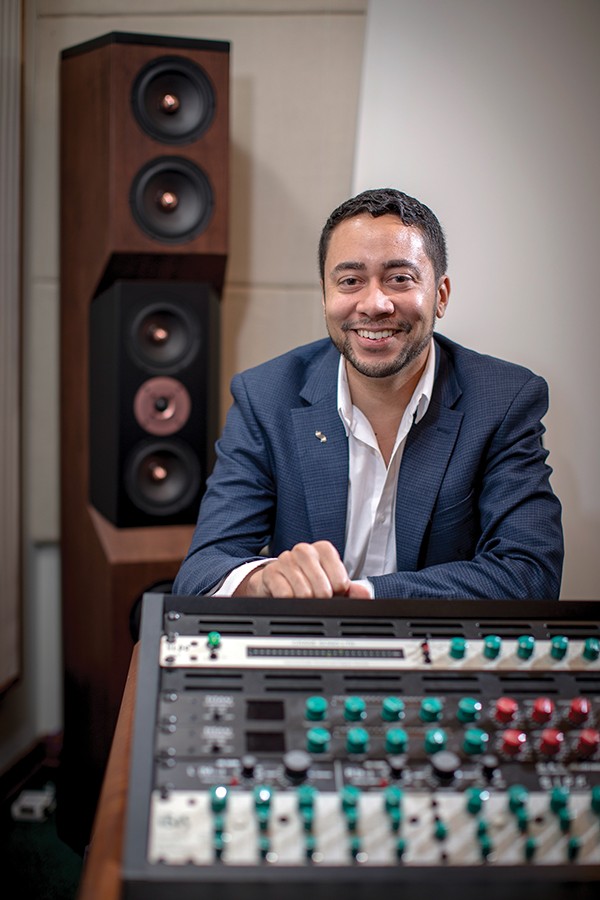Some months ago, the Flyer profiled a fast-rising local startup that is revolutionizing the way music credits, liner notes, and artwork are documented. Soundways, the brainchild of Memphis native Gebre Waddell, first made a name for itself as a creator of mastering and recording software, but when a consortium of music production and distribution giants crafted an industry-wide standard for embedding credits within sound files, Waddell and his team jumped into the fray and designed Sound Credit, software that could actually accomplish what those standards called for. They saw how crucial it was to document all efforts that go in to a music track, and their respect for the writers, engineers, producers, and musicians who do that work paid off when their prototype was internationally embraced.
He could have moved to Silicon Valley then, but realizing his dream in his hometown has always been important to Waddell. He’s often promoted the city while pushing his own brand. “I brought Larry Crane, chief editor for Tape Op magazine, here to Memphis and interviewed him at the Stax Museum. Following the event, Memphis studios and brands, including Soundways, were on the cover of Tape Op for six months straight.”
 Photographs by Justin Fox Burks
Photographs by Justin Fox Burks
Gebre Waddell
Waddell envisions a tech renaissance here, one that his company can help jump-start. Lately, that grounding in the Mid-South has paid off in unexpected ways.
As Waddell explains, “About 79 percent of venture capital goes to just three states: California, New York, and Massachusetts. All the rest of the states have to fight over what’s left. Leading investors noticed this trend and wanted to support businesses in these other states. Some of them — with Steve Case, the founder of AOL, kinda leading it, but also including Jeff Bezos from Amazon, Meg Whitman, Michael Bloomberg, and about 30 others — started this investment group called Revolution. It’s a $150 million fund, and they’re looking for those best companies in the interior of the U.S.”
Astute readers will guess where this is going: “Revolution decided they’re going to choose five winners in five different cities, based on these pitch competitions. Well, they chose Memphis as one of the locations. I felt a lot of pressure, with the Memphis business leadership there, and all the people who came out for this event. We had a morning breakfast with Elon Musk’s brother, Kimbal Musk. And Fred Smith was there, the Wilson family was there, the mayor was there, all these people.” He takes a breath, reliving his nervousness. “Long story short, we won it. Suddenly, we’re appearing to the investment world as one of the top-five companies in the interior of the United States to invest in today.”
As the Revolution website describes it, the aim was “to spotlight and celebrate rising entrepreneurial ecosystems and to invest $100,000 in a local startup in each city.” Their quotes from Waddell are in keeping with his local pride. “Memphis’ history of innovation in music provides unparalleled insight, relationships, and authenticity in this space that could not be found anywhere else,” Waddell told them. “Memphis places the highest value on being your true self, whatever that happens to be. That authenticity underlies our strength in music, logistics, and medical innovation.”
When we first profiled Soundways, the company expected to launch Sound Credit within weeks. But their perfectionism delayed that. “Once you get it to the level of quality that you want, and the vision is there and everything’s working, then it’s easy to see another level of quality,” Waddell explains. “So it was that kind of process: test and refine, test and refine. And now we’re past it. It’s finalized, it’s out there.”
Indeed, simply typing “sound.credit” into your browser will take users to the new website, where they’re greeted with a running scroll of albums both obscure and classic. Though it’s just a sample of the hoped-for universal archive planned, clicking an album image on the site is a bit like perusing the notes on album covers from the golden age of vinyl. Every detail is documented. And it hasn’t taken long for the industry to take notice. Pro Tools, the most common recording software in music today, is already promoting it, much to Waddell’s delight. “They’re going to cover Sound Credit on a podcast, every episode, for the next 12 episodes in a row.”
Streaming services can’t be far behind. “Spotify and Amazon and others will want to follow through with the standard that they helped outline,” Waddell says. “This is our space now. We’re the leading voice for music credits around the world from right here in Memphis. We built the dream.”